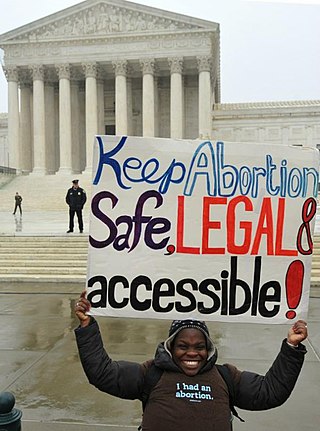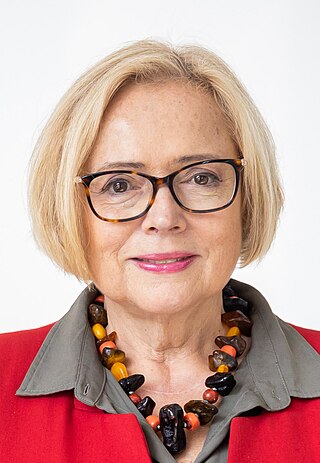
The United Nations Population Fund (UNFPA), formerly the United Nations Fund for Population Activities, is a UN agency aimed at improving reproductive and maternal health worldwide. Its work includes developing national healthcare strategies and protocols, increasing access to birth control, and leading campaigns against child marriage, gender-based violence, obstetric fistula, and female genital mutilation.
Women's health differs from that of men's health in many unique ways. Women's health is an example of population health, where health is defined by the World Health Organization (WHO) as "a state of complete physical, mental and social well-being and not merely the absence of disease or infirmity". Often treated as simply women's reproductive health, many groups argue for a broader definition pertaining to the overall health of women, better expressed as "The health of women". These differences are further exacerbated in developing countries where women, whose health includes both their risks and experiences, are further disadvantaged.
Reproductive rights are legal rights and freedoms relating to reproduction and reproductive health that vary amongst countries around the world. The World Health Organization defines reproductive rights as follows:
Reproductive rights rest on the recognition of the basic right of all couples and individuals to decide freely and responsibly the number, spacing and timing of their children and to have the information and means to do so, and the right to attain the highest standard of sexual and reproductive health. They also include the right of all to make decisions concerning reproduction free of discrimination, coercion and violence.
The United Nations coordinated an International Conference on Population and Development (ICPD) in Cairo, Egypt, on 5–13 September 1994. Its resulting Programme of Action is the steering document for the United Nations Population Fund (UNFPA).

Sexual and reproductive health (SRH) is a field of research, health care, and social activism that explores the health of an individual's reproductive system and sexual well-being during all stages of their life. Sexual and reproductive health is more commonly defined as sexual and reproductive health and rights, to encompass individual agency to make choices about their sexual and reproductive lives.

The Commission on the Status of Women is a functional commission of the United Nations Economic and Social Council (ECOSOC), one of the principal organs of the United Nations. CSW has been described as the UN organ promoting gender equality and the empowerment of women. Every year, representatives of member states gather at United Nations Headquarters in New York to evaluate progress on gender equality, identify challenges, set global standards and formulate concrete policies to promote gender equality and advancement of women worldwide. In April 2017, ECOSOC elected 13 new members to CSW for a four-year term 2018–2022. One of the new members is Saudi Arabia, which has been criticised for its treatment of women.
The International Planned Parenthood Federation (IPPF) is a global non-governmental organisation with the broad aims of promoting sexual and reproductive health, and advocating the right of individuals to make their own choices in family planning. It was first formed in 1952 in Bombay, India, by Margaret Sanger and Lady Rama Rau at the Third International Conference on Planned Parenthood with support of an expanding population with limited resources. Presently, it consists of more than 149 Member Associations working in more than 189 countries. The IPPF is highly developed and organised into six regions. The organisation is based in London, England.
MSI Reproductive Choices, named Marie Stopes International until November 2020, is an international non-governmental organisation providing contraception and safe abortion services in 37 countries around the world. MSI Reproductive Choices as an organisation lobbies in favour of access to abortion, and provides a variety of sexual and reproductive healthcare services including advice, vasectomies, and abortions in the UK and other countries where it is legal to do so. It is based in London and is a registered charity under English law.

Reproductive justice is a critical feminist framework that was invented as a response to United States reproductive politics. The three core values of reproductive justice are the right to have a child, the right to not have a child, and the right to parent a child or children in safe and healthy environments. The framework moves women's reproductive rights past a legal and political debate to incorporate the economic, social, and health factors that impact women's reproductive choices and decision-making ability.

The Center for Women's Global Leadership, based at Rutgers University, was founded in 1989 by Charlotte Bunch, the former executive director and an internationally renowned activist for women's human rights. Executive Director Krishanti Dharmaraj is also the founder of the Dignity Index and co-founder of WILD for Human Rights and the Sri Lanka Children's Fund. The former executive director, Radhika Balakrishnan, is now the faculty director, and a professor in the Department of Women's and Gender Studies at Rutgers, chair of the Board of the US Human Rights Network, and a board member of the Center for Constitutional Rights. Located on Douglass Residential College at Rutgers University, CWGL is a unit of International Programs within the School of Arts and Sciences and is a member of the Institute for Women's Leadership, a consortium of women's programs at Rutgers.
Abortion in Venezuela is currently illegal except in some specific cases outlined in the Venezuelan Constitution, and the country has one of Latin America's most restrictive laws.
The Dominican Republic is one of 24 countries in the world and one of six in Latin America that has a complete ban on abortion. This complete ban includes situations in which a pregnant person’s life is at risk.

Abortion-rights movements, also self-styled as pro-choice movements, advocate for the right to have legal access to induced abortion services including elective abortion. They seek to represent and support women who wish to terminate their pregnancy without fear of legal or social backlash. These movements are in direct opposition to anti-abortion movements.
Sexual and reproductive health and rights or SRHR is the concept of human rights applied to sexuality and reproduction. It is a combination of four fields that in some contexts are more or less distinct from each other, but less so or not at all in other contexts. These four fields are sexual health, sexual rights, reproductive health and reproductive rights. In the concept of SRHR, these four fields are treated as separate but inherently intertwined.

Latin America is home to some of the few countries of the world with a complete ban on abortion and minimal policies on reproductive rights, but it also contains some of the most progressive reproductive rights movements in the world. With roots in indigenous groups, the issues of reproductive rights include abortion, sexual autonomy, reproductive healthcare, and access to contraceptive measures. Modern reproductive rights movements most notably include Marea Verde, which has led to much reproductive legislation reform. Cuba has acted as a trail-blazer towards more liberal reproductive laws for the rest of Latin America, while other countries like El Salvador and Honduras have tightened restrictions on reproductive rights.

Sonia Corrêa is a feminist activist and researcher from Brazil, working primarily on issues of gender equality, health and sexuality. Since 2002, she has co-chaired Sexuality Policy Watch (SPW), a global policy forum analysing global trends in sexuality related policies and projects.
28 September is International Safe Abortion Day. The day was first celebrated as a day of action for decriminalization of abortion in Latin America and the Caribbean in 1990 by the Campaña 28 Septiembre. In 2011, the Women's Global Network for Reproductive Rights (WGNRR) declared 28 September as an international day. The date was chosen to commemorate the passing of the Law of Free Birth passed by the Brazilian parliament on September 28, 1871. This law was a key legal reform intended to provide freedom for the children of enslaved people in Brazil at the time.

Wanda Hanna Nowicka is a Polish activist and politician, Member of Parliament of Poland during 7th (2011–2015) and 9th terms (2019–2023). She served as the Deputy Marshal of the Sejm of the Republic of Poland from 8 November 2011 to 11 November 2015.
The SisterSong Women of Color Reproductive Justice Collective, also known as SisterSong, is a national activist organization dedicated to reproductive justice for women of color.
In 2005, the Ethiopian Parliament liberalised the abortion law to grant safe abortions to women in specific circumstances.









